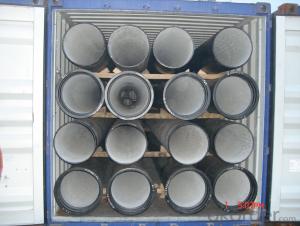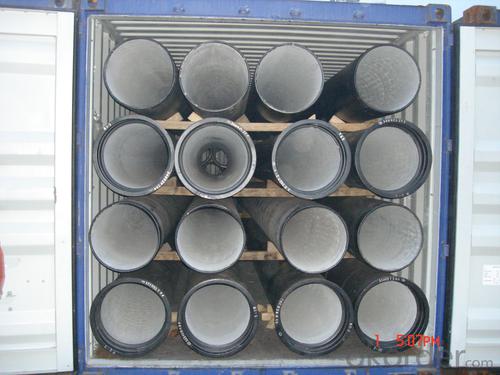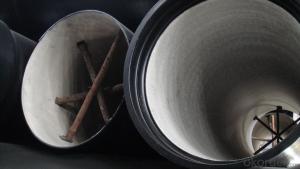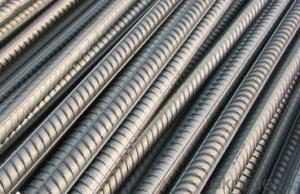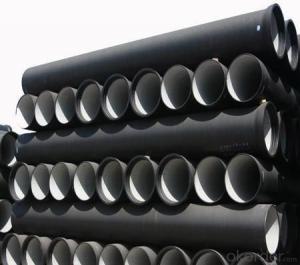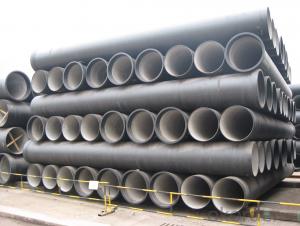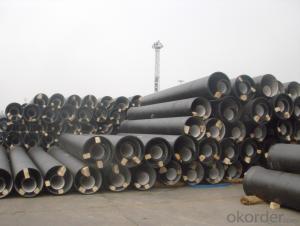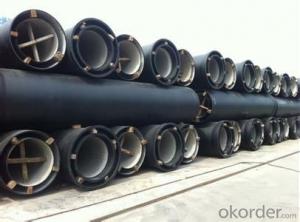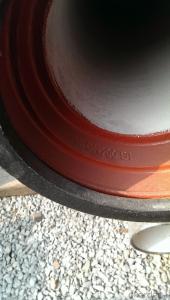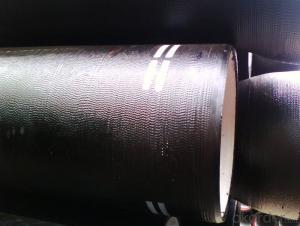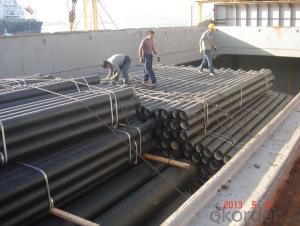ductile iron pipeDN125 K9 socket spigot pipes
- Loading Port:
- Tianjin
- Payment Terms:
- TT OR LC
- Min Order Qty:
- 25
- Supply Capability:
- 30000 /month
OKorder Service Pledge
OKorder Financial Service
You Might Also Like
1) The standard of pipe: ISO2531:1998, EN545:2006,K9 K8
2) Effective length: 6m/5.7m
3) Inner cement line: Portland cement lineas per ISO4179
4) Zinc coating: at least 130g/m2 as per ISO8179
5) Bitumen painting: at least 70μm as per ISO8179
6)With 102% quantity of NBR, SBR, or EPDM ring asper ISO4633
7) DN80-DN1200
8) Highstrength, lighter than grey iron, good corrosion resistance, no furring, smallflow resistance, easy fixing, long life tome about 100 yeas
9)Checked by automatic inspection equipment
10) Composition:
Chemical composition | |||
Chemical composition | Ductile Cast Iron Pipe (%) | Grey iron pipe (%) | Steel pipe (%) |
C | 3.5-4.0 | 3.2-3.8 | 0.1-0.2 |
Si | 1.9-2.6 | 1.4-2.2 | 0.15-0.4 |
Mn | 0.15-0.45 | 0.4-0.6 | 0.3-0.6 |
P | ≤0.06 | ≤0.3 | 0.02-0.03 |
S | ≤0.02 | ≤0.1 | 0.02-0.03 |
Mg | 0.03-0.06 |
|
|
11) Feature:
Mechanical properties | |||
| Ductile Cast Iron Pipe | Grey Iron Pipe | Steel Pipe |
Tensile Strength(Mpa) | ≥420 | 150-260 | ≥400 |
Yield Strength(Mpa) | ≥300 | No Confirmation | No Confirmation |
Bending Strength(Mpa) | ≥590 | 200-360 | ≥400 |
Elongation (%) | ≥10 | Neglected | ≥18 |
Brinell Hardness(HBS) | ≤230 | ≤230 | About 140 |
12) T type mechanical joint
13) Packing: in bulk or container
PACKING: 1) Pipesare bundled together with the steel belt.
2) Wooden pieces are put between the pipes.
- Q: The difference between ductile cast iron pipe and machine-made cast iron pipe
- Different installation methods, ductile iron pipes are common flexible sealing ring, slide into the connection; the main drainage pipe is W and B type, clamp connection and mechanical connection, the inner gasket ring.
- Q: Can ductile iron pipes be used for slurry transportation?
- Yes, ductile iron pipes can be used for slurry transportation. Ductile iron pipes are known for their strength and durability, which makes them suitable for transporting various types of fluids, including slurry. They have the ability to withstand the abrasive nature of slurry and can effectively handle the pressure and flow requirements associated with slurry transportation.
- Q: Are ductile iron pipes suitable for use in industrial applications?
- Yes, ductile iron pipes are suitable for use in industrial applications. Ductile iron pipes are known for their high strength and durability, making them ideal for handling the demands of industrial environments. They are resistant to corrosion and can withstand high pressures and temperatures. Additionally, ductile iron pipes have excellent impact resistance, making them suitable for use in areas with heavy traffic or potential for mechanical damage. Their flexibility allows them to absorb vibrations and shocks, further enhancing their suitability for industrial applications. Overall, ductile iron pipes are a reliable and cost-effective choice for various industrial sectors such as water and wastewater treatment, mining, power generation, and chemical plants.
- Q: Is nodular cast iron pipe filled with Yau Ma Tei?
- Ductile iron pipes are defined as pipes made by casting more than 18 of casting molten iron by adding a spheroidal agent and then centrifugally centrifugally cast by a centrifugal nodular cast iron machineDuctile iron pipe ([span]Ductile Cast Iron Pipes), referred to as ball pipe, ductile iron pipe and ductile iron pipe etc..
- Q: What is the expected thrust restraint method for ductile iron pipes?
- The expected thrust restraint method for ductile iron pipes is typically achieved through the use of thrust blocks or restraints, which are designed to counteract the forces generated by the fluid pressure within the pipeline. These blocks or restraints are typically made of concrete or other sturdy materials and are strategically placed at bends, tees, and other locations where changes in direction occur. They help to anchor the pipes and prevent them from moving or being displaced due to the thrust forces.
- Q: What are the different sizes of ductile iron pipes available?
- Ductile iron pipes are available in a variety of sizes to cater to different applications and requirements. The sizes of ductile iron pipes typically range from 3 inches to 64 inches in diameter. These different sizes allow for flexibility and adaptability in various industries such as water supply, sewage systems, irrigation, and industrial piping. The smaller diameter ductile iron pipes, such as those in the range of 3 to 12 inches, are commonly used for residential and small-scale applications like household plumbing, fire hydrant systems, and small irrigation projects. These sizes are often found in urban areas and residential neighborhoods. For more extensive applications, larger diameter ductile iron pipes are utilized. They can range from 14 inches up to 64 inches in diameter. These larger pipes are predominantly used in municipal water supply systems, wastewater treatment plants, and industrial facilities where high-volume water flow is required. The availability of a wide range of sizes in ductile iron pipes ensures that they can accommodate various flow rates and pressure requirements. It allows engineers, contractors, and designers to select the appropriate size based on the specific needs of a particular project or application. It is essential to consult industry standards, local regulations, and engineering guidelines to determine the suitable size of ductile iron pipes for any specific project. This ensures that the pipes are capable of meeting the required performance standards and are suitable for the intended use.
- Q: Why does the cast iron pipe always run off when testing?
- The pipeline is installed, straight section of each pipe will be added pier, concrete pipe, elbow, three links should also have concrete pier, specific installation method according to GB Atlas 03SS515, and the straight pipe to soil, pipeline interface will be exposed, easy to check.
- Q: What is the cost of ductile iron pipe compared to other pipe materials?
- The cost of ductile iron pipe compared to other pipe materials can vary depending on various factors such as the size, length, and specific requirements of the project. However, generally speaking, ductile iron pipe tends to be more expensive than some of the alternative pipe materials such as PVC or HDPE (high-density polyethylene) pipes. Ductile iron pipe is known for its exceptional strength and durability, making it suitable for a wide range of applications including water distribution, wastewater systems, and industrial piping. Its robustness and longevity contribute to its higher cost compared to other pipe materials. On the other hand, PVC and HDPE pipes are often more affordable options due to their lower production and material costs. Additionally, these materials are lightweight, easy to install, and resistant to corrosion, which can lead to cost savings during installation and maintenance. It is important to note that while ductile iron pipe may have a higher upfront cost, its superior strength and longevity can result in long-term cost savings by minimizing the need for frequent repairs or replacements. The choice of pipe material should be made considering the specific project requirements, budget constraints, and the anticipated lifespan of the infrastructure.
- Q: Can ductile iron pipes be made of flexible waterproof sleeves?
- Usually, a bushing is used to make a pool. It is the conduit to the sink. However, the common casing is difficult to seal so that there is water leakage between the casing and the pipe and water leakage between the casing and the wall. Only the waterproof sleeve can solve the water leakage between the casing and the wall, but it can not solve the seal between the casing and the pipe, and the flexible waterproof bushing can solve two problems.
- Q: Are ductile iron pipes compatible with other pipe materials?
- Yes, ductile iron pipes are compatible with other pipe materials. They can be connected to pipes made of various materials such as PVC, HDPE, steel, and more, using appropriate fittings and connectors.
Send your message to us
ductile iron pipeDN125 K9 socket spigot pipes
- Loading Port:
- Tianjin
- Payment Terms:
- TT OR LC
- Min Order Qty:
- 25
- Supply Capability:
- 30000 /month
OKorder Service Pledge
OKorder Financial Service
Similar products
Hot products
Hot Searches
Related keywords
